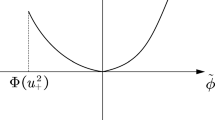Abstract
This paper is concerned with a stability problem in a periodic domain for a non-isentropic Euler–Maxwell system without temperature diffusion term. This system is used to describe the dynamics of electrons in magnetized plasmas when the ion density is a given smooth function which can be large. When the initial data are close to the steady states of the system, we show the global existence of smooth solutions which converge toward the steady states as the time tends to infinity. We make a change of unknown variables and choose a non-diagonal symmetrizer of the full Euler equations to get the dissipation estimates. We also adopt an induction argument on the order of derivatives of solutions in energy estimates to get the stability result.
Similar content being viewed by others
References
Besse, C., Degond, P., Deluzet, F., Claudel, J., Gallice, G., Tessieras, C.: A model hierarchy for ionospheric plasma modeling. Math. Models Methods Appl. Sci. 14, 393–415 (2004)
Chen, F.: Introduction to plasma physics and controlled fusion, vol. 1. Plenum Press, New York (1984)
Chen, G.Q., Jerome, J.W., Wang, D.: Compressible Euler–Maxwell equations. Trans. Theory Statist. Phys. 29, 311–331 (2000)
Degond, P., Markowich, P.: A steady state potential flow model for semiconductors. Ann. Mat. Pura Appl. 52, 87–98 (1993)
Duan, R.J.: Global smooth flows for the compressible Euler–Maxwell systems: the relaxation case. J. Hyperbol. Diff. Equ. 8, 375–413 (2010)
Feng, Y.H., Peng, Y.J., Wang, S.: Stability of non-constant equilibrium solutions for two-fluid Euler–Maxwell systems. Nonlinear Anal. Real World Appl. 26, 372–390 (2015)
Feng, Y.H., Wang, S., Kawashima, S.: Global existence and asymptotic decay of solutions to the non-isentropic Euler–Maxwell system. Math. Meth. Appl. Sci. 24, 2851–2884 (2014)
Feng, Y.H., Wang, S., Li, X.: Stability of non-constant steady-state solutions for non-isentropic Euler–Maxwell system with a temperature damping term. Math. Meth. Appl. Sci. 39, 2514–2528 (2016)
Germain, P., Masmoudi, N.: Global existence for the Euler–Maxwell system. Ann. Sci. Ecole Norm. Supér. 47, fascicule 3, 469–503 (2014)
Guo, Y., Strauss, W.: Stability of semiconductor states with insulating and contact boundary conditions. Arch. Ration. Mech. Anal. 170, 1–30 (2005)
Guo, Y., Ionescu, A., Pausader, B.: Global solutions of the Euler–Maxwell two-fluid system in 3D. Ann. of Math. 183, 377–498 (2016)
Kato, T.: The cauchy problem for quasi-linear symmetric hyperbolic systems. Arch. Ration. Mech. Anal. 58, 181–205 (1975)
Klainerman, S., Majda, A.: Singular limits of quasilinear hyperbolic systems with large parameters and the incompressible limit of compressible fluids. Commun. Pure Appl. Math. 34, 481–524 (1981)
Lax, P.D.: Hyperbolic systems of conservation laws and the mathematical theory of shock waves, SIAM Regional Conf. Lecture, No. 11, Philadelphia, (1973)
Li, X., Wang, S., Feng, Y.H.: Stability of non-constant steady-state solutions for bipolar non-isentropic Euler–Maxwell equations with damping terms. Z. Angew. Math. Phys. 67(5), 27 (2016)
Liu, C.M., Peng, Y.J.: Stability of periodic steady-state solutions to a non-isentropic Euler–Poisson system. J. Diff. Equ. 262, 5497–5517 (2017)
Liu, Q.Q., Zhu, C.J.: Asymptotic stability of stationary solutions to the compressible Euler–Maxwell equations. Indiana Univ. Math. J. 62, 1203–1235 (2013)
Majda, A.: Compressible fluid flow and systems of conservation laws in several space variables. Springer-Verlag, New York (1984)
Peng, Y.J.: Stability of non-constant equilibrium solutions for Euler–Maxwell equations. J. Math. Pure. Appl. 103, 39–67 (2015)
Peng, Y.J., Wang, S., Gu, Q.L.: Relaxation limit and global existence of smooth solutions of compressible Euler–Maxwell equations. SIAM J. Math. Anal. 43, 940–970 (2011)
Ueda, Y., Kawashima, S.: Decay property of regularity-loss type for the Euler–Maxwell system. Methods Appl. Anal. 18, 245–267 (2011)
Xu, J.: Global classical solutions to the compressible Euler–Maxwell equations. SIAM J. Math. Anal. 43(6), 2688–2718 (2011)
Author information
Authors and Affiliations
Corresponding author
Rights and permissions
About this article
Cite this article
Liu, C., Peng, YJ. Stability of periodic steady-state solutions to a non-isentropic Euler–Maxwell system. Z. Angew. Math. Phys. 68, 105 (2017). https://doi.org/10.1007/s00033-017-0848-y
Received:
Published:
DOI: https://doi.org/10.1007/s00033-017-0848-y



